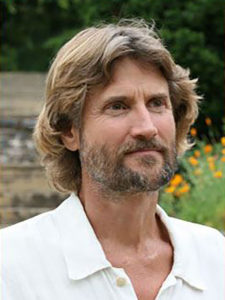
Will Tuttle is a PhD in Education of Berkeley University in California. He is also a professional pianist and composer and has spoken and performed for the past fifteen years at reformed churches, vegetarian and human potential seminars, and purpose specific societies throughout the United States.
Will Tuttle was born in a scholarly family in the New England of Eastern United States. His father is a celebrity in the journalistic circles and owns 13 newspapers. His mother is an illustrator. He grew up under the influence of music and his parents’ talents, and practiced chorus with his father in the mountains oftentimes. After completing his doctorate, Mr. Tuttle taught at the university. Six years later, he resolutely quit teaching at Berkeley University in order to promote vegetarianism and returned to the traveling life. He lives with his wife in a trailer and travel all over the United States to give lectures.
Mr. Tuttle is not only an artist, but also a dreamer and a revolutionary. He believes that the revolution of veganism is the greatest revolution since the beginning of mankind, because it is a revolution of consciousness, thoroughly practicing the saint’s doctrine of “Do not do onto others what you do not want others to do onto yourself.” and “All beings are one.” It transcends the boundary of species and includes the animal kingdom as a human concern.
Mr. Tuttle believes oppressing other species is the real cause of all the problems nowadays in the world, and the only way for human kind to have a future is to change our diet. Therefore, he wrote this book World Peace Diet and carefully analyzed the far-reaching effects of food choices on human consciousness, mind, body, spirit, environment, ecology, society, culture, and human relationships. A set of universal principles for all conscientious people is also offered in the book. This set of principles shows how we can evolve our consciousness to make freer and wiser choices.
The author of this book has an unique and profound insight. There are few people can explain the impact of food on the world through a combination knowledge of psychology, philosophy, physics and ecology. Hence I posted excerpts from the book on the site after asking the author’s permission, for the convenience of everyone to read.
Written on November 16, 2012






